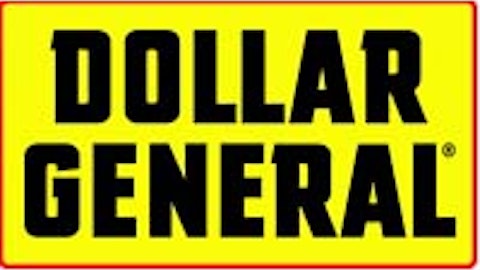Many discount retailers got off to a slow start at the beginning of this fiscal year, and Target Corporation (NYSE:TGT), whose fiscal Q1 ended in early May, was no exception. According to the company’s 10-Q, revenue was about flat for the quarter versus a year earlier, with an increase in store count being offset by a small decrease in same-store sales. Thanks to higher interest expenses, Target recorded a 29% decline in earnings compared to a year ago and if we ignore the proceeds on sale of its credit card accounts receivable cash flow from operations was lower as well.
Target Corporation (NYSE:TGT) currently trades at 17 times its trailing earnings, a valuation which seems to indicate that the market is expecting the retailer’s prospects to improve going forward. Wall Street analysts predict that this fiscal year’s earnings per share will be about even with last year’s before the company significantly grows its EPS in the fiscal year ending in January 2015; as a result, the forward P/E is 13. That would place Target close to value territory though of course we wouldn’t have too much confidence in business suddenly picking up next year. As might be expected for a discount retailer, Target’s stock price has a fairly low correlation with market indices at a beta of 0.5. The company recently increased its quarterly dividend payments, but the yield remains unremarkable at 2.4%.

Target’s peers include larger competitor Wal-Mart Stores, Inc. (NYSE:WMT) and Costco Wholesale Corporation (NASDAQ:COST). In terms of trailing earnings Wal-Mart is priced at a slight discount to Target, at 15 times trailing earnings, though its growth going forward is supposed to be lower and as a result the two retailers are valued about even with each other as far as forward P/Es go. Its most recent quarterly report actually showed decent revenue and earnings numbers, and with similar defensive characteristics it might be a better prospect. Costco has been growing nicely, with revenue up and net margins expanding, but markets have seized onto that already. With trailing and forward earnings multiples of 25 and 22 respectively, the stock is priced at a bit too much of a premium for us right now.
We can also compare Target Corporation (NYSE:TGT) to dollar stores including Dollar General Corp. (NYSE:DG) and Dollar Tree, Inc. (NASDAQ:DLTR). Each of these companies experienced revenue growth in the high single digits in their most recent quarter compared to the same period in the previous fiscal year. Dollar Tree did a better job of cutting its costs, resulting in a 15% increase in earnings over the same time frame, but Dollar General managed at least modest growth on its bottom line as well. These two stocks also tend to be even less connected to the overall economy than Target or Wal-Mart, with betas of about 0.1 in each case. However, Dollar General and Dollar Tree each feature a trailing earnings multiple of 19 and therefore are priced at a premium to Target and Wal-Mart on that basis. Still, given their superior financial performance it’s possible that they will continue to grow enough to justify this higher pricing.
As a result we don’t like Target Corporation (NYSE:TGT) very much right now. Wal-Mart appears cheaper on an earnings basis, with its recent numbers looking better than Target’s if anything. In addition, while the dollar stores we’ve mentioned here are certainly not cheap enough to be pure value stocks they have continued to grow their earnings and could be worth investigating as well.
Disclosure: I own no shares of any stocks mentioned in this article.




